Big Red Book
Celebrating television's This Is Your Life
The Audience

Since the first edition of This Is Your Life - when Ralph Edwards surprised the show's future host Eamonn Andrews in the BBC Television Theatre - the live audience has been an essential factor in the programme's success.
In the early BBC period, the theatre audience invariably included the source of that week's subject - invited along on some pretence. And later, in the Thames Television period, the studio audience would often play an important part in the surprise...
related pages...
the programme's icon
the programme's best kept secrets
the iconic titles and theme tunes
the studio look and locations
the show's fifty year history
During the early BBC period of This Is Your Life, which ran between 1955 and 1964, programmes invariably opened with Eamonn Andrews teasing members of the BBC Television Theatre audience as to who would be that week's subject.
Eamonn would move through the theatre stalls, chatting to members of the audience and suggesting to some that their name may be printed on the cover of that week's This Is Your Life book before springing his surprise on an unsuspecting individual who had no doubt been lured to the theatre under a false pretence.
The subject - suddenly realising their presence in the audience was all part of a secretive plot, and with hardly any time to comprehend what was happening - would then find themselves being marched onto the theatre's stage to have their life story revealed to the millions of television viewers.
This tactic was used in the first edition of This Is Your Life on British television, when the host of the original American version of the show, Ralph Edwards, surprised the future host of the British version Eamonn Andrews in the stalls of the BBC Television Theatre.
In a strange but neat symmetry, the practice of surprising the subject in the audience saw the very first regular subject - after Eamonn's edition - former Special Operations Executive Yvonne Bailey, and the very last subject of the early BBC period, the nurse Mary Hawkins, both surprised in the audience at the BBC Television Theatre.

The Australian singer and entertainer Albert Whelan was surprised by Eamonn Andrews in the audience at the BBC Television Theatre in September 1957 for the first programme of the third series

Eamonn Andrews surprised the novelist Barbara Cartland - for the first of her two This Is Your Life tributes - in the audience at the BBC Television Theatre in March 1958
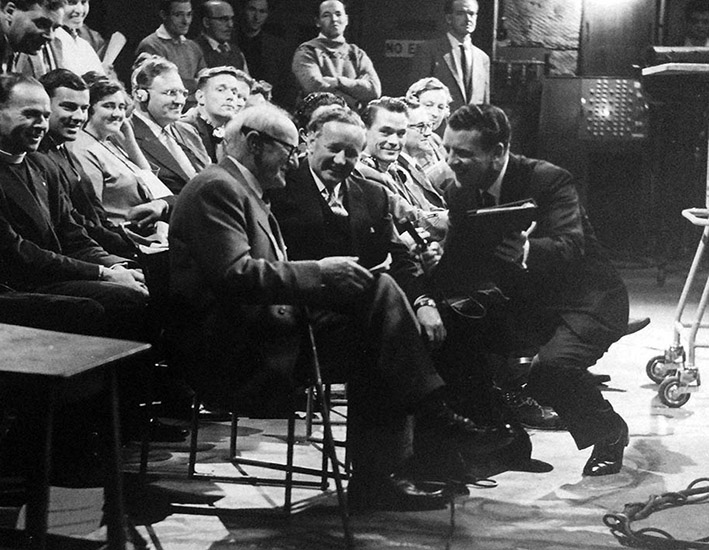
The charity campaigner Captain George Frederick Bennett was surprised by Eamonn Andrews in September 1960 - this time in the audience at the BBC Riverside Studios in Hammersmith, London
Once the programme was re-launched by Thames Television in 1969, the 'pick-up' - the way a subject was surprised - became more ambitious and elaborate and often took place out of the studio, so the technique of surprising subjects in the audience was used less frequently. However, the studio audience would occasionally still play a part in the surprise element of the show.
A programme would often start with Eamonn Andrews explaining to the audience that the subject was en route to the studio - invited under false pretences - and for the surprise to work, they - the audience - were asked to remain silent, and sometimes sit in the dark, until the moment the subject was led into the studio and Eamonn revealed the big red book. At that point, the audience was expected to react enthusiastically, with loud clapping and cheering!
This device created a greater sense of anticipation and helped make the surprise - or 'pick-up' more effective for the subject - and the television viewers at home.
Subjects were still surprised in the audience occasionally:

The Roman Catholic priest and missionary Francis O'Leary was surprised by Eamonn Andrews in the audience at Thames Television's Euston Road Studios - having been tricked into attending the studio by one of the show's regular writers, Tom Brennand, in May 1973
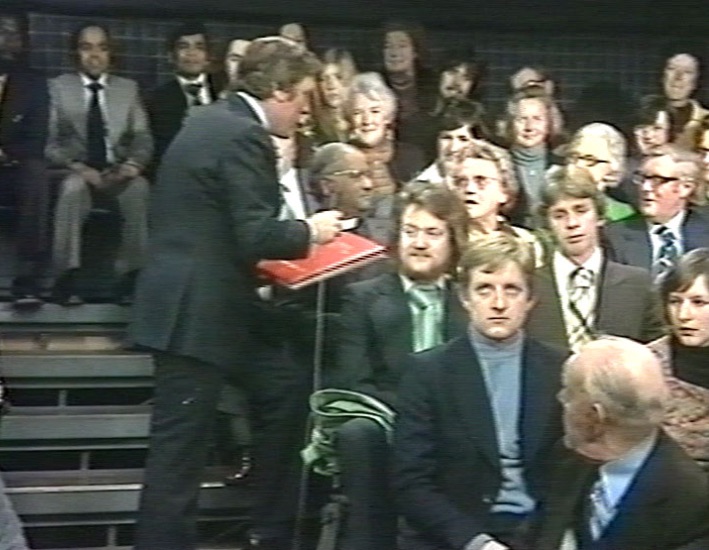
Eamonn Andrews surprised the medical missionary Florence Priest in the audience at Studio 5 at Thames Television's Euston Road Studios in January 1977
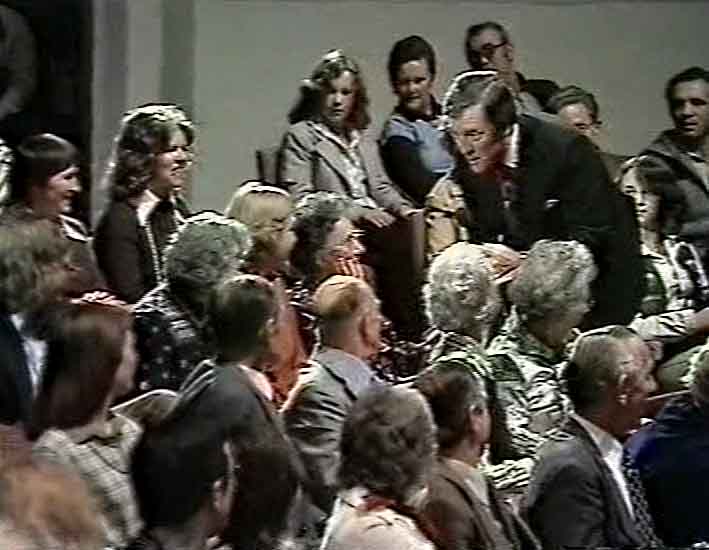
Alice Goldberger, a child therapist who cared for the orphaned child survivors of concentration camps after the Second World War, was surprised by Eamonn Andrews in the audience at the New London Theatre for a live broadcast in October 1978
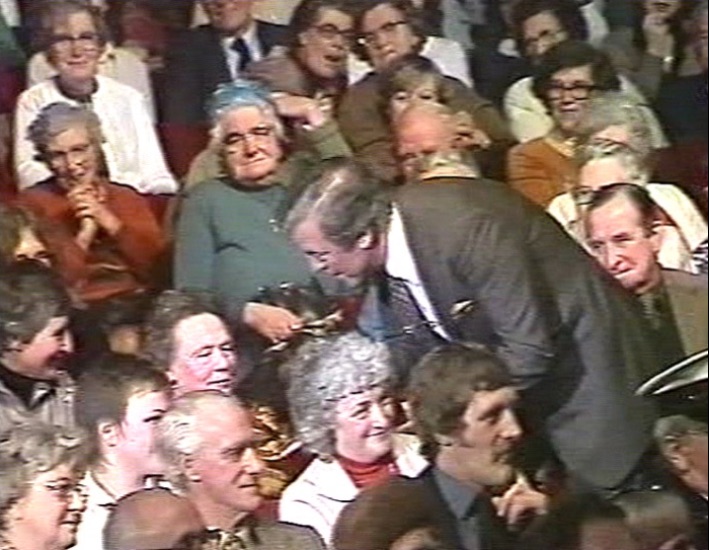
For a special Christmas Day broadcast in 1980, foster mother Joan Wells was surprised by Eamonn Andrews in the audience at the Royalty Theatre - having been led to believe she was there to watch a Christmas carol concert
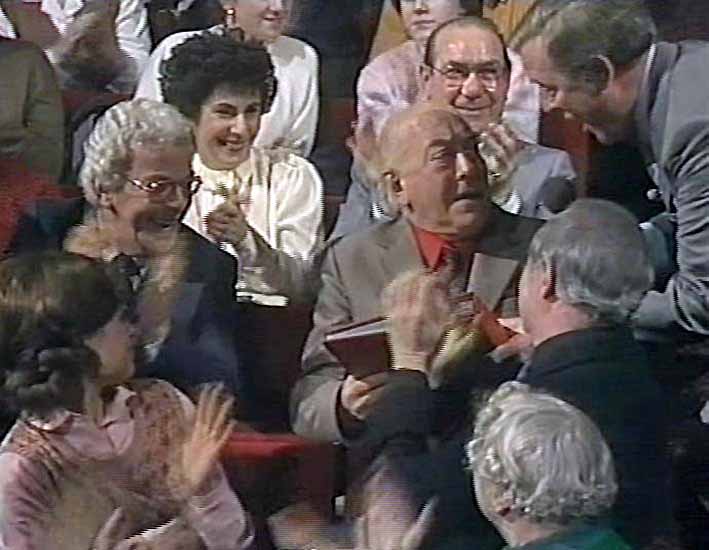
In February 1984, Eamonn Andrews surprised the comedy actor Bob Todd in the audience at the Royalty Theatre - Bob was under the impression the subject was to be writer and comedian Barry Cryer, who was seated next to him
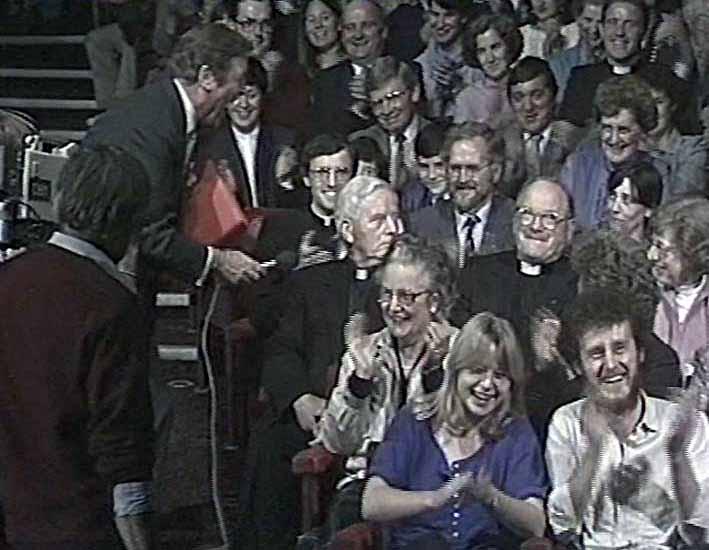
In November 1984, Eamonn Andrews announced, 'Forgive me, father, for I have conned both of you' as he surprised the brothers and priests Kevin and Michael Doheny in the audience at the Royalty Theatre - each of them had been told the other brother was to be the subject!
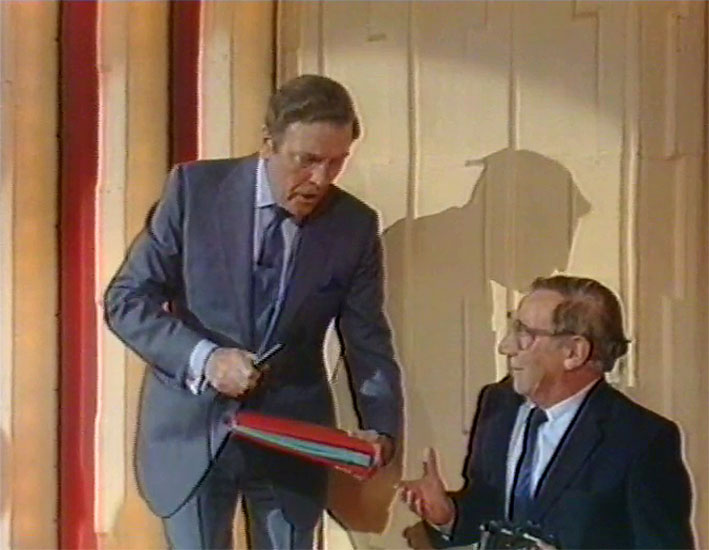
Fleet Street press photographer Monty Fresco was lured to Thames Television's Teddington Studios in November 1986 on an assignment to photograph what he thought was the moment Eamonn Andrews would surprise journalist Nigel Dempster - who was in the studio audience. However, the tables were turned, and Monty found himself in the spotlight
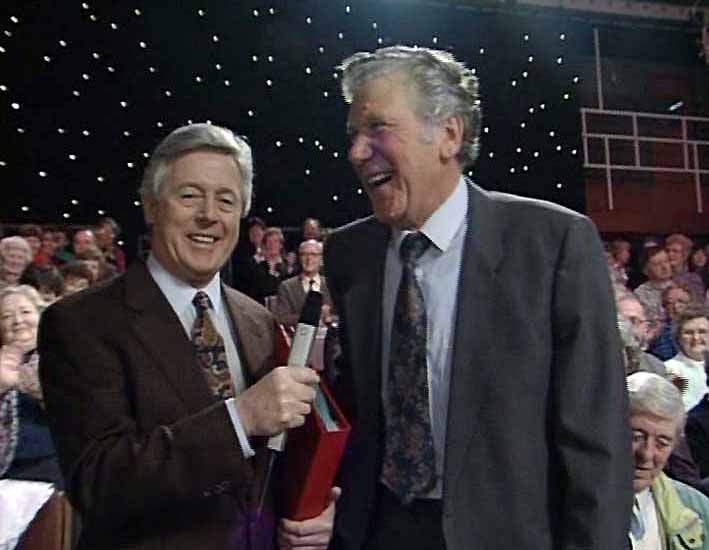
New host Michael Aspel isn't predisposed to surprising subjects in the studio audience - except for Jim Howard - one of the most pivotal figures within Oxfam - who was surprised in the audience at Thames Television's Teddington Studios in February 1992 on the eve of the charity's 50th anniversary

And on one occasion, the audience of an entirely different show was infiltrated when in March 1991, Michael Aspel surprised the actor David Tomlinson in the audience at London's Strand Theatre - where he had just watched a matinee performance of the pantomime Snow White starring Marti Caine

And sometimes there just wasn't enough space on the This Is Your Life set to seat all the guests - and so, on those occasions, extra guests would be placed in the audience - as was the case in November 1974 with Coronation Street's Jack Howarth and a group of veterans from his old regiment, the Lancashire Fusiliers
And on several rare occasions, the This Is Your Life audience has been full of This Is Your Life subjects -
Musician and band leader Joe Loss was surprised by Eamonn Andrews in October 1980 at London's Portman Hotel during a star-studded party to celebrate his 50 years in show business.
Peer and film producer Lord Brabourne, known professionally as John Brabourne, was surprised by Michael Aspel at the Old Brewery venue in the city of London in September 1990. This edition of This Is Your Life was presented as the 501st produced by Thames Television (actually, it was the 529th edition) and was recorded in front of a specially invited audience of past subjects.
Michael Aspel hosted a star-studded event celebrating a thousand editions of This Is Your Life - The Night of 1000 Lives - which was recorded in front of an audience of former subjects and broadcast in January 2000.
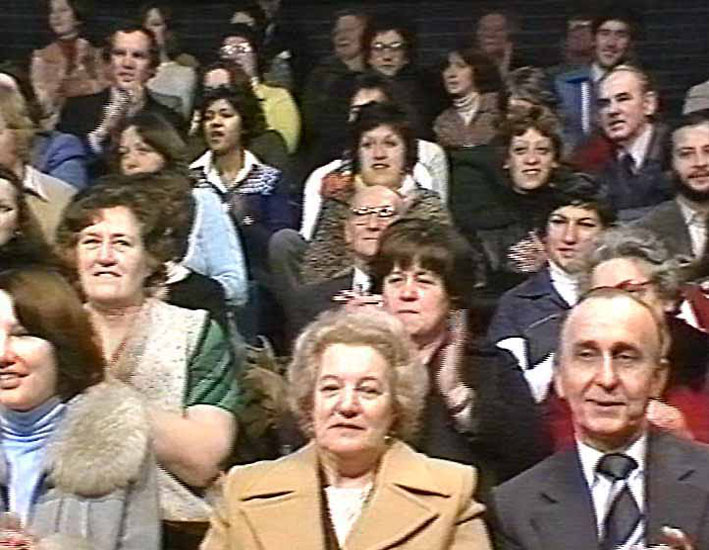
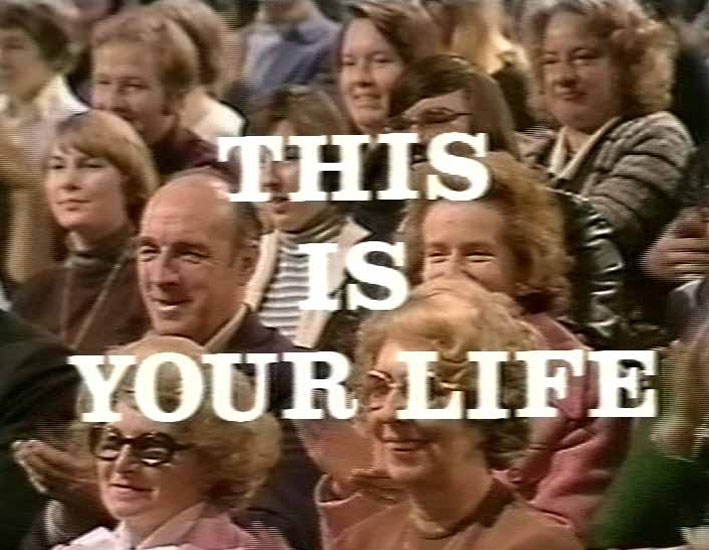
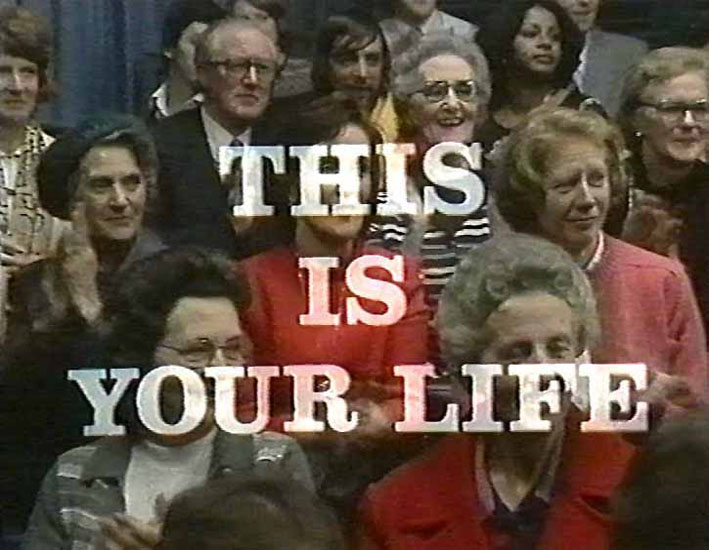
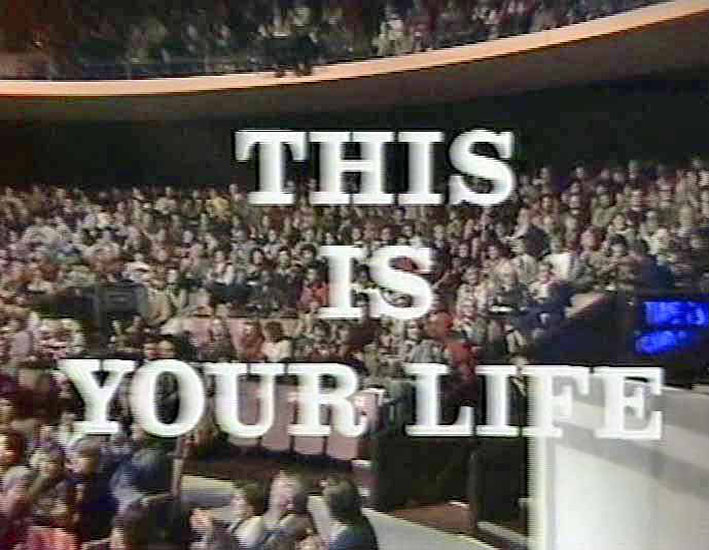
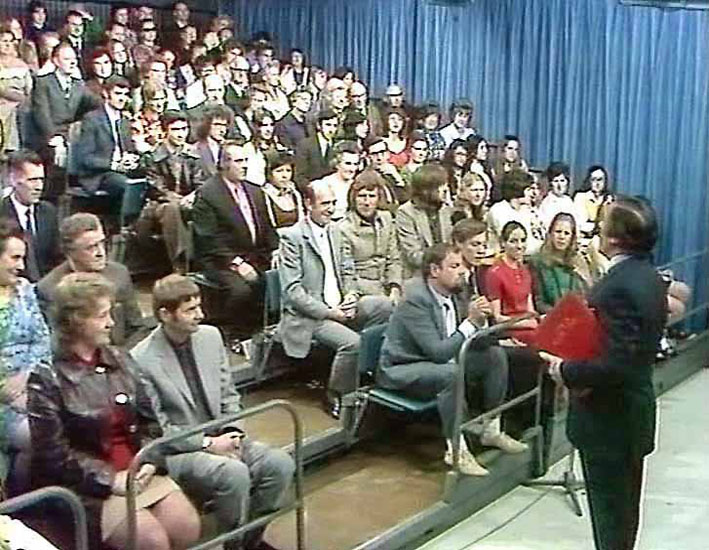
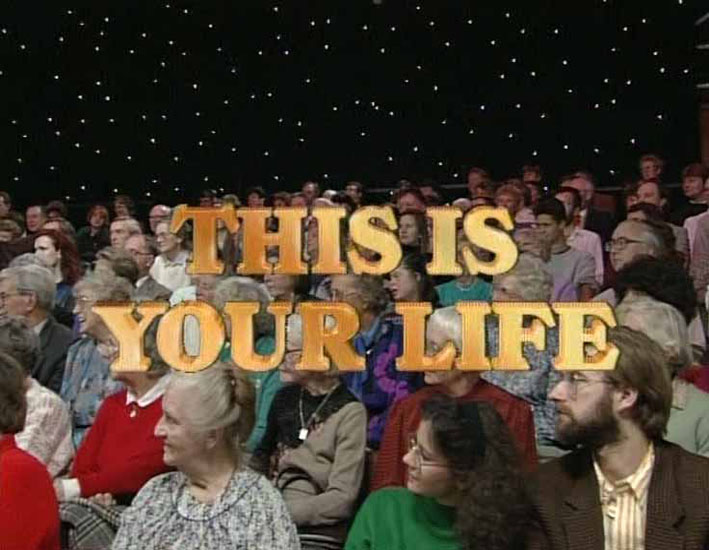
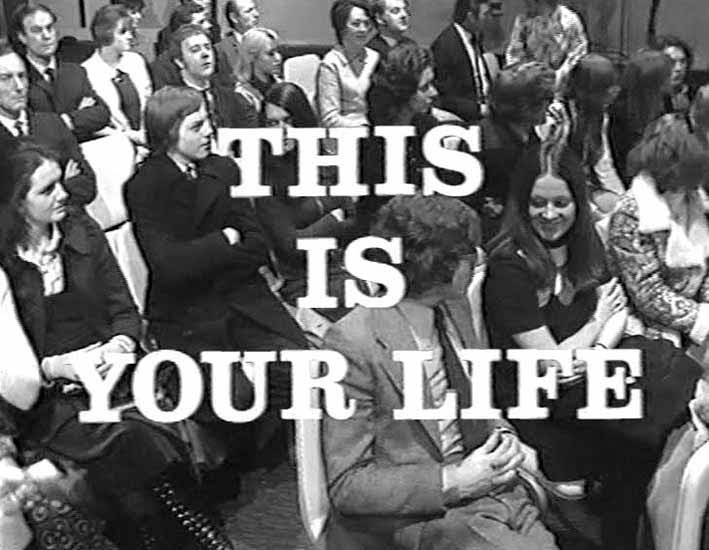
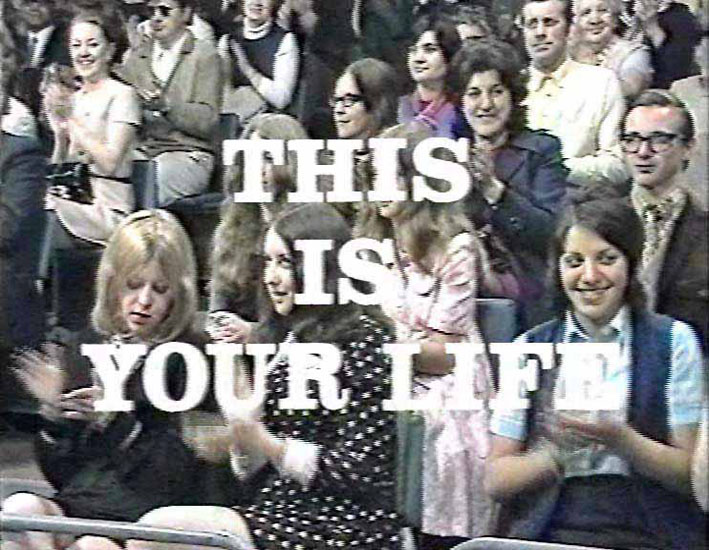
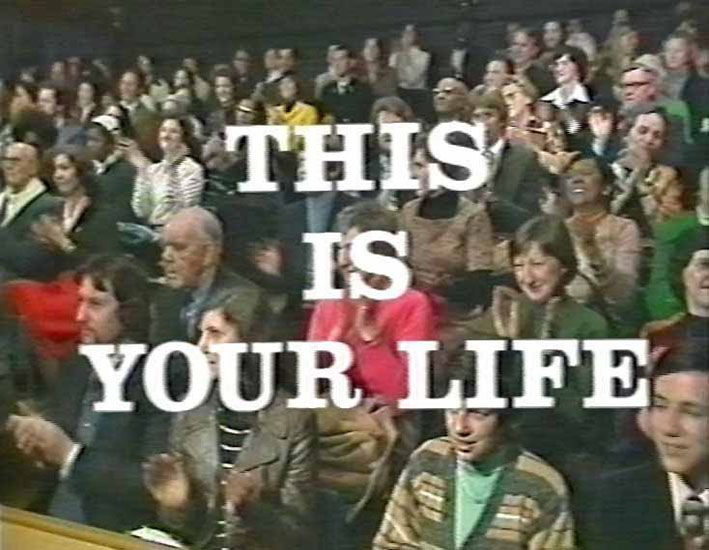
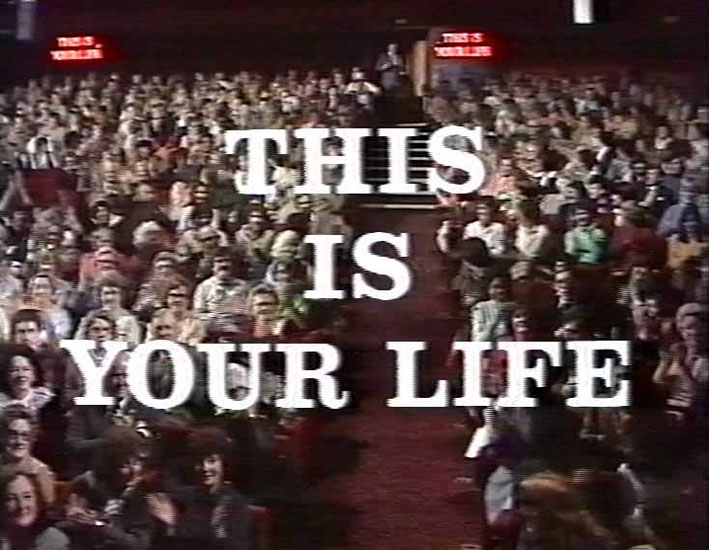
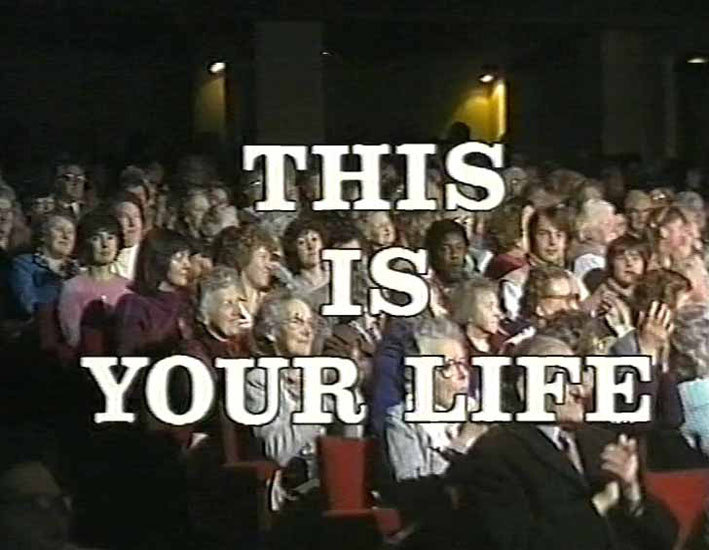
A selection of screenshots featuring This Is Your Life audiences
Television companies often use a 'warm-up' act to make the studio audience feel integral to the programme being made - to get the audience in the mood, keeping them amused, entertained and informed about how things work and what is required of them during the recording or live broadcast.
This Is Your Life employed several warm-up acts over the years, including a familiar television actor who became a subject in January 1986...

Felix Bowness - a regular cast member of the BBC sitcom Hi-de-Hi! - was surprised while carrying out his duties as the warm-up man for the This Is Your Life audience. The production team had ensured that Felix's watch was running slow, so he didn't realise the cameras were already recording when Eamonn Andrews appeared and retrieved the big red book from a shopping bag belonging to a lady in the front row!
Another regular warm-up act for This Is Your Life, Denny Piercy, was featured in the following article - from an undated, unknown source...
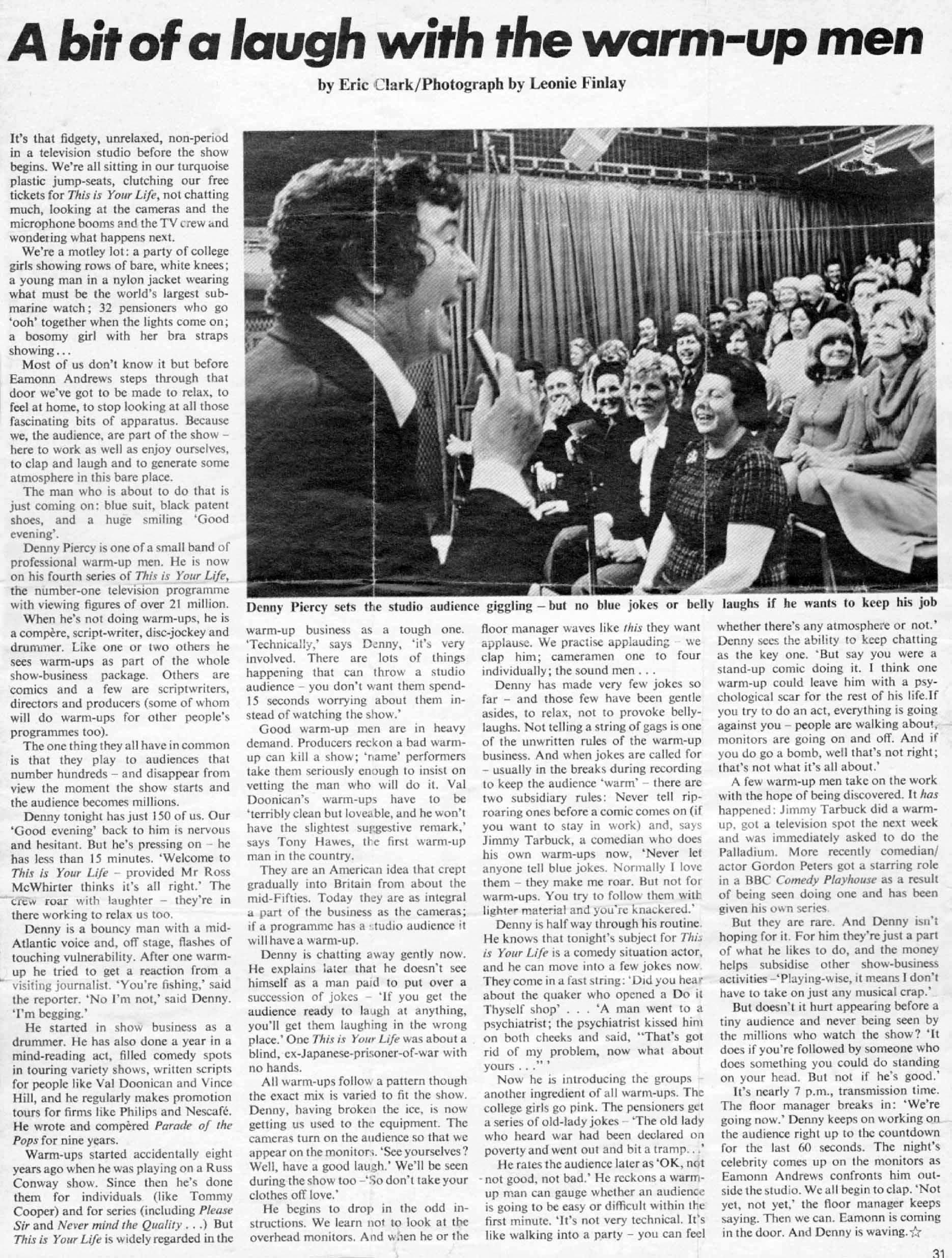
A bit of a laugh with the warm-up men
By Eric Clark / Photograph by Leonie Finlay
It's that fidgety, unrelaxed, non-period in a television studio before the show begins. We're all sitting in our turquoise plastic jump-seats, clutching our free tickets for This Is Your Life, not chatting much, looking at the cameras and the microphone booms and the TV crew and wondering what happens next.
We're a motley lot: a party of college girls showing rows of bare, white knees; a young man in a nylon jacket wearing what must be the world's largest submarine watch; 32 pensioners who go 'ooh' together when the lights come on; a bosomy girl with her bra straps showing...
Most of us don't know it but before Eamonn Andrews steps through that door we've got to be made to relax, to feel at home, to stop looking at all those fascinating bits of apparatus. Because we, the audience, are part of the show – here to work as well as enjoy ourselves, to clap and laugh and to generate some atmosphere in this bare place.
The man who is about to do that is just coming on: blue suit, black patent shoes, and a huge smiling 'Good evening'.
Denny Piercy is one of a small band of professional warm-up men. He is now on his fourth series of This Is Your Life, the number-one television programme with viewing figures of over 21 million.
When he's not doing warm-ups, he is a compere, script-writer, disc-jockey and drummer. Like one or two others he sees warm-ups as part of the whole show-business package. Others are comics and a few are script-writers, directors and producers (some of whom do warm-ups for other people's programmes too).
The one thing they all have in common is that they play to audiences that number hundreds - and disappear from view the moment the show starts and the audience becomes millions.
Denny tonight has just 150 of us. Our 'Good evening' back to him is nervous and hesitant. But he's pressing on – he has less than 15 minutes. 'Welcome to This Is Your Life – provided Mr Ross McWhirter thinks it's all right.' The crew roar with laughter – they're in there working to relax us too.
Denny is a bouncy man with a mid-Atlantic voice and, off stage, flashes of touching vulnerability. After one warm-up he tried to get a reaction from a visiting journalist. 'You're fishing,' said the reporter. 'No I'm not,' said Denny. 'I'm begging.'
He started in show business as a drummer. He has also done a year in a mind-reading act, filled comedy spots in touring variety shows, written scripts for people like Val Doonican and Vince Hill, and he regularly makes promotion tours for firms like Philips and Nescafe. He wrote and compered Parade of the Pops for nine years.
Warm-ups started accidentally eight years ago when he was playing on a Russ Conway show. Since then he's done them for individuals (like Tommy Cooper) and for series (including Please Sir and Never Mind The Quality...). But This Is Your Life is widely regarded in the warm-up business as a tough one. 'Technically,' says Denny, 'it's very involved. There are lots of things happening that can throw a studio audience – you don't want them spending 15 seconds worrying about them instead of watching the show.'
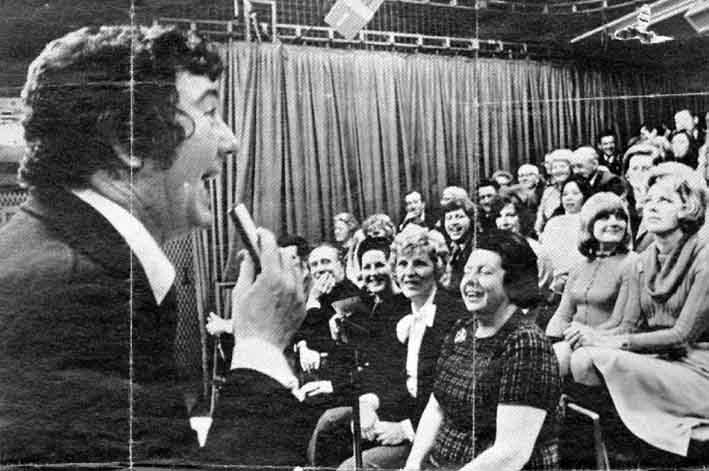
Denny Piercy sets the studio audience giggling - but no blue jokes or belly laughs if he wants to keep his job
Good warm-up men are in heavy demand. Producers reckon a bad warm-up can kill a show; 'name' performers take them seriously enough to insist on vetting the man who will do it. Val Doonican's warm-ups have to be 'terribly clean but loveable, and he won't have the slightest suggestive remark,' says Tony Hawes, the first warm-up man in the country.
They are an American idea that crept gradually into Britain from about the mid-Fifties. Today they are as integral a part of the business as the cameras; if a programme has a studio audience it will have a warm-up.
Denny is chatting away gently now. He explains later that he doesn't see himself as a man paid to put over a succession of jokes – 'If you get the audience ready to laugh at anything, you'll get them laughing in the wrong place.' One This Is Your Life was about a blind, ex-Japanese-prisoner-of-war with no hands.
All warm-ups follow a pattern though the exact mix is varied to fit the show. Denny, having broken the ice, is now getting us used to the equipment. The cameras turn on the audience so that we appear on the monitors. 'See yourselves? Well, have a good laugh.' We'll be seen during the show too – 'So don't take your clothes off love.'
He begins to drop in the odd instructions. We learn to look at the overhead monitors. And when he or the floor manager waves like this they want applause. We practise applauding – we clap him; cameramen one to four individually; the sound men...
Denny has made very few jokes so far – and those few have been gentle asides, to relax, not to provoke belly laughs. Not telling a string of gags is one of the unwritten rules of the warm-up business. And when jokes are called for – usually in the breaks during recording to keep the audience 'warm' – there are two subsidiary rules: Never tell rip-roaring ones before a comic comes on (if you want to stay in work) and, says Jimmy Tarbuck, a comedian who does his own warm-ups now, 'Never let anyone tell blue jokes. Normally I love them – they make me roar. But not for warm-ups. You try to follow them with lighter material and you're knackered.'
Denny is halfway through his routine. He knows that tonight's subject for This Is Your Life is a comedy situation actor, and he can move into a few jokes now. They come in a fast string: 'Did you hear about the quaker who opened a Do it Thyself shop...' 'A man went to a psychiatrist; the psychiatrist kissed him on both cheeks, and said, "That's got rid of my problem, now what about yours..."'
Now he is introducing the groups – another ingredient of all warm-ups. The college girls go pink. The pensioners get a series of old-lady jokes – 'The old lady who heard war had been declared on poverty and went out and bit a tramp...'
He rates the audience later as 'OK, not good, not bad.' He reckons a warm-up man can gauge whether an audience is going to be easy or difficult within the first minute. 'It's not very technical. It's like walking into a party – you can feel whether there's any atmosphere or not.' Denny sees the ability to keep chatting as the key one. 'But say you were a stand-up comic doing it. I think one warm-up could leave him with a psychological scar for the rest of his life. If you try to do an act, everything is going against you – people are walking about, monitors are going on and off. And if you do go a bomb, well that's not right; that's not what it's all about.'
A few warm-up men take on the work with the hope of being discovered. It has happened: Jimmy Tarbuck did a warm-up, got a television spot the next week and was immediately asked to do the Palladium. More recently comedian/actor Gordon Peters got a starring role in a BBC Comedy Playhouse as a result of being seen doing one and has been given his own series.
But they are rare. And Denny isn't hoping for it. For him they're just part of what he likes to do, and the money helps subsidise other show-business activities – 'Playing-wise, it means I don't have to take on just any musical crap.'
But doesn't it hurt appearing before a tiny audience and never being seen by the millions who watch the show? 'It does if you're followed by someone who does something you could do standing on your head. But not if he's good.'
It's nearly 7pm, transmission time. The floor manager breaks in: 'We're going now.' Denny keeps on working on the audience right up to the countdown for the last 60 seconds. The night's celebrity comes up on the monitors as Eamonn Andrews confronts him outside the studio. We all begin to clap. 'Not yet, not yet,' the floor manager keeps saying. Then we can. Eamonn is coming in the door. And Denny is waving.
To attend a recording of This Is Your Life, tickets had to be applied for through the production company.
Below are examples of audience tickets used for This Is Your Life...
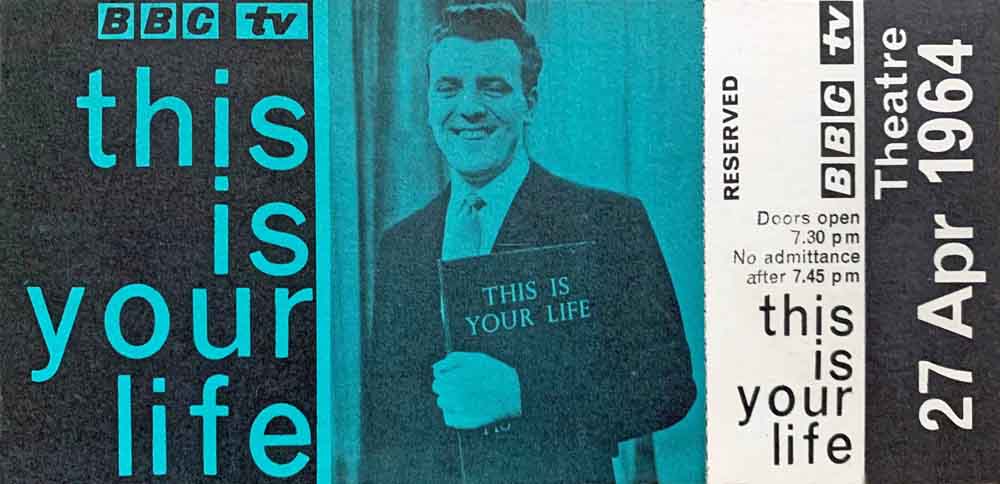
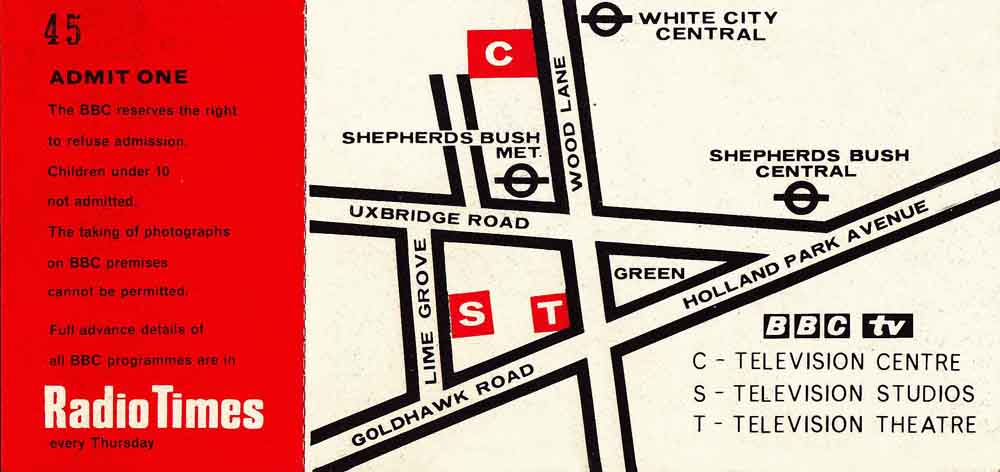
27 April 1964 - the recording of the edition featuring the last BBC subject - nurse Mary Hawkins - broadcast on 30 April 1964
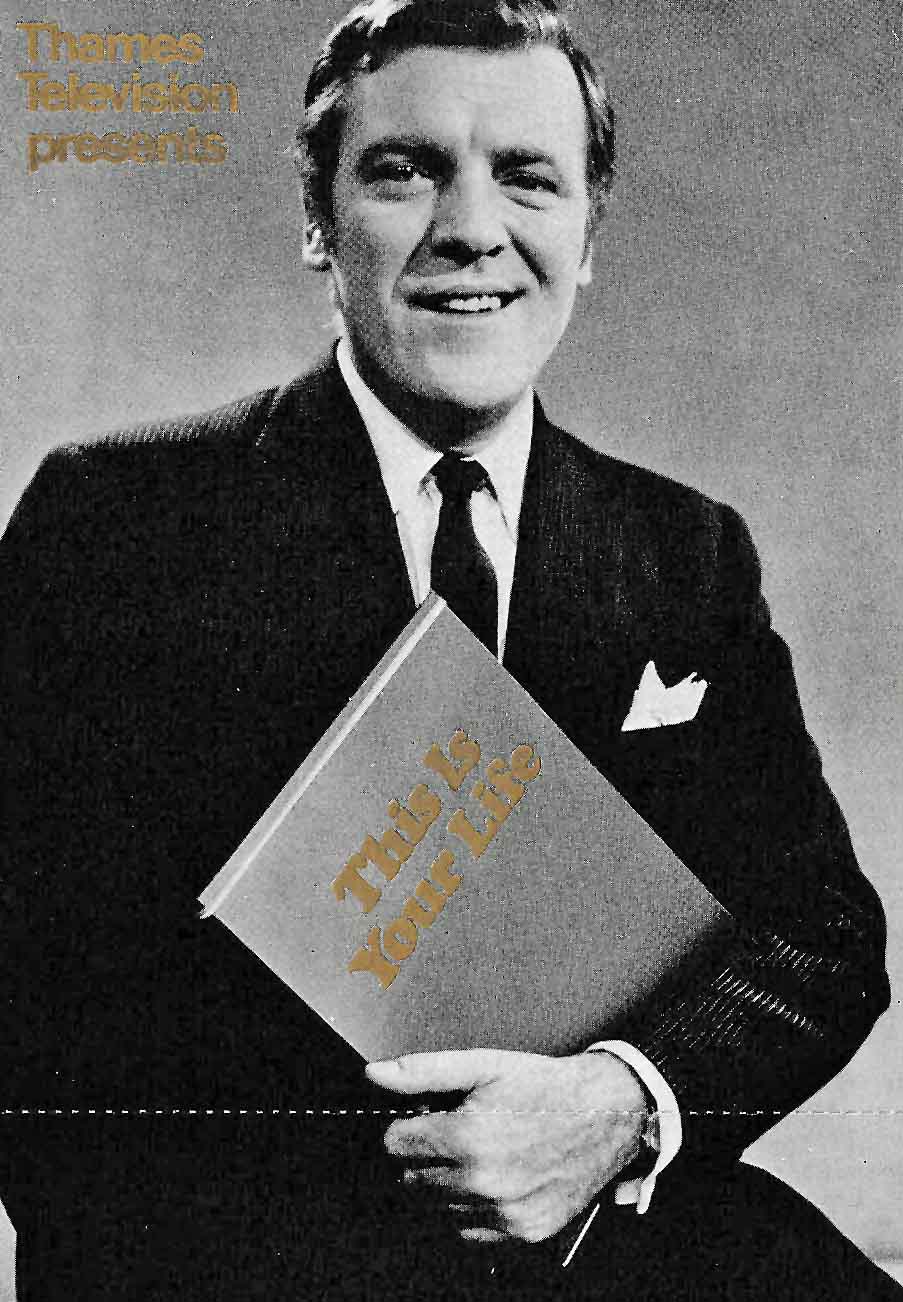
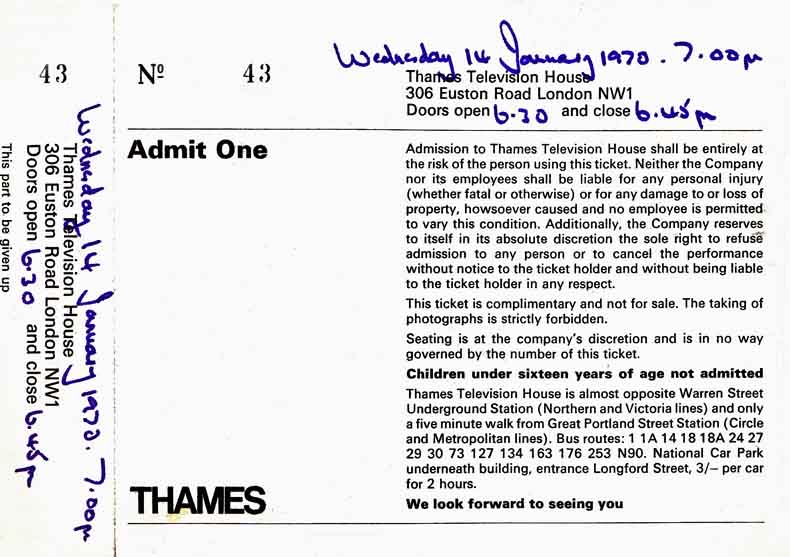
14 January 1970 - a live broadcast of the edition featuring the heavyweight boxer Henry Cooper
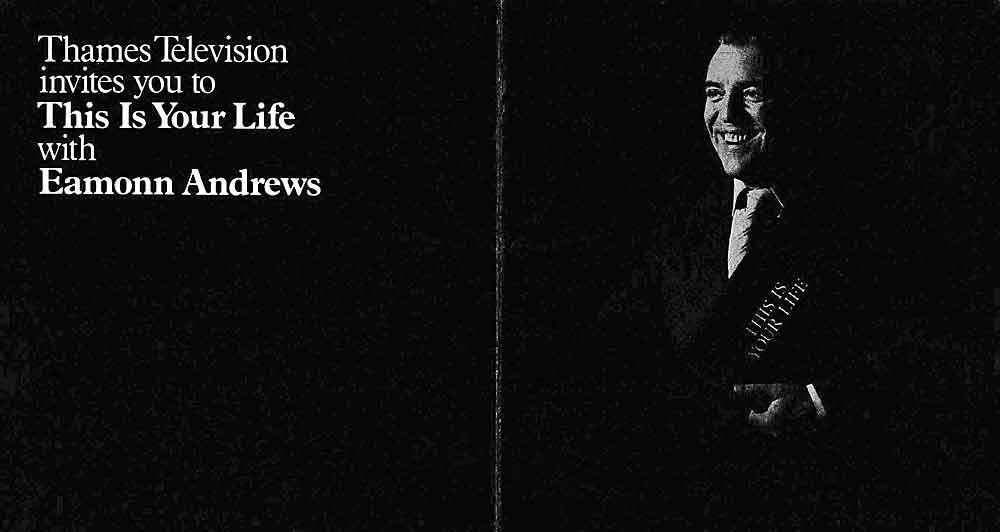
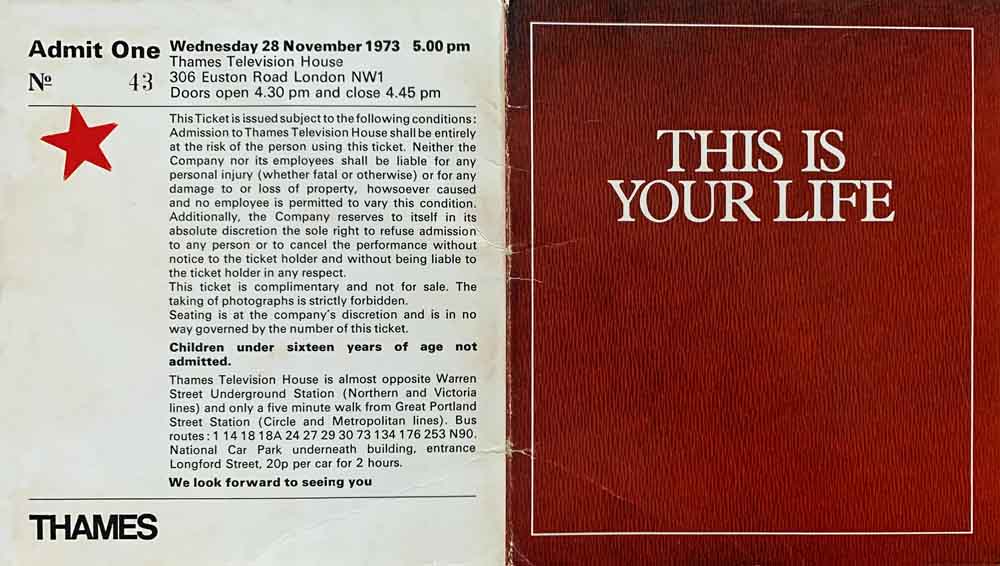
28 November 1973 - the recording of the edition featuring the actress Hayley Mills - broadcast on 5 December 1973
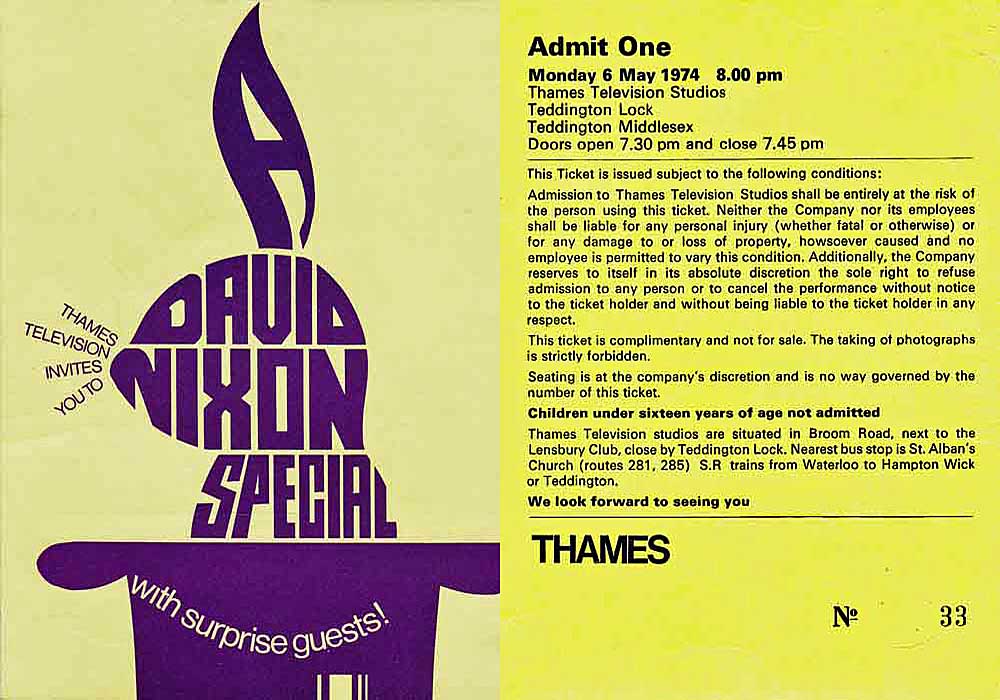
6 May 1974 - during the recording of this particular David Nixon Show, the magician surprised This Is Your Life host Eamonn Andrews with the Big Red Book for his second tribute - note 'with surprise guests' printed on the ticket!
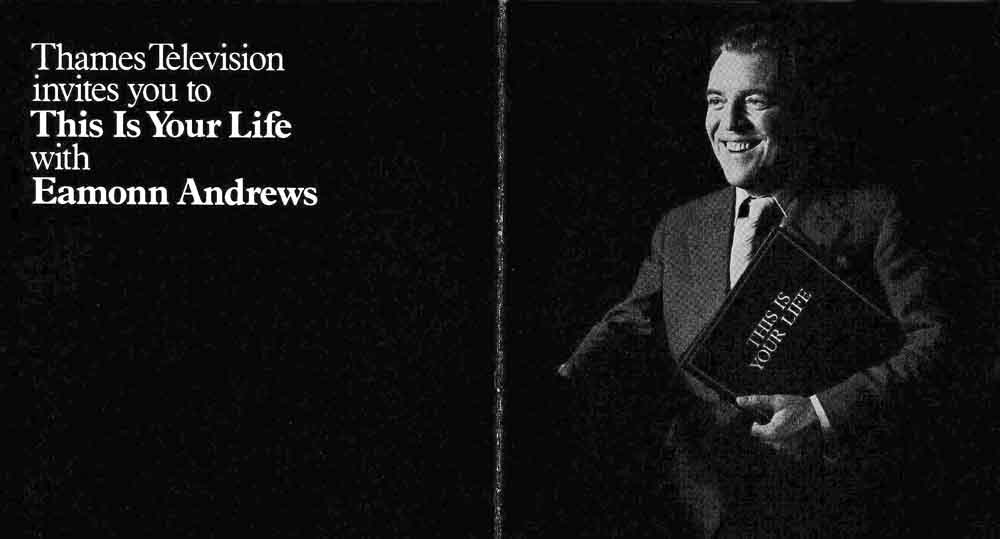
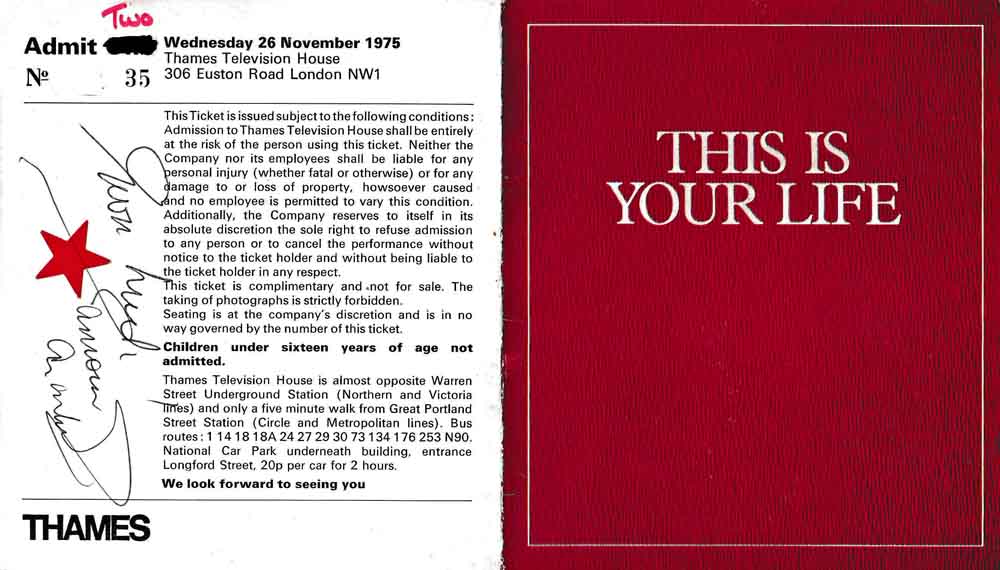
26 November 1975 - the recording of the edition featuring the scientist and broadcaster Magnus Pyke - broadcast on 10 December 1975. The ticket is signed by host Eamonn Andrews
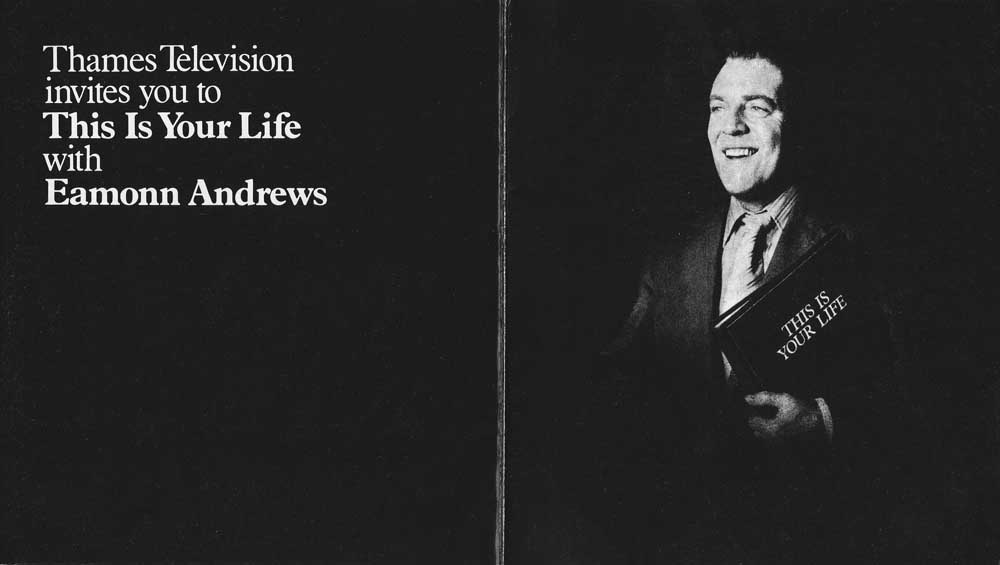
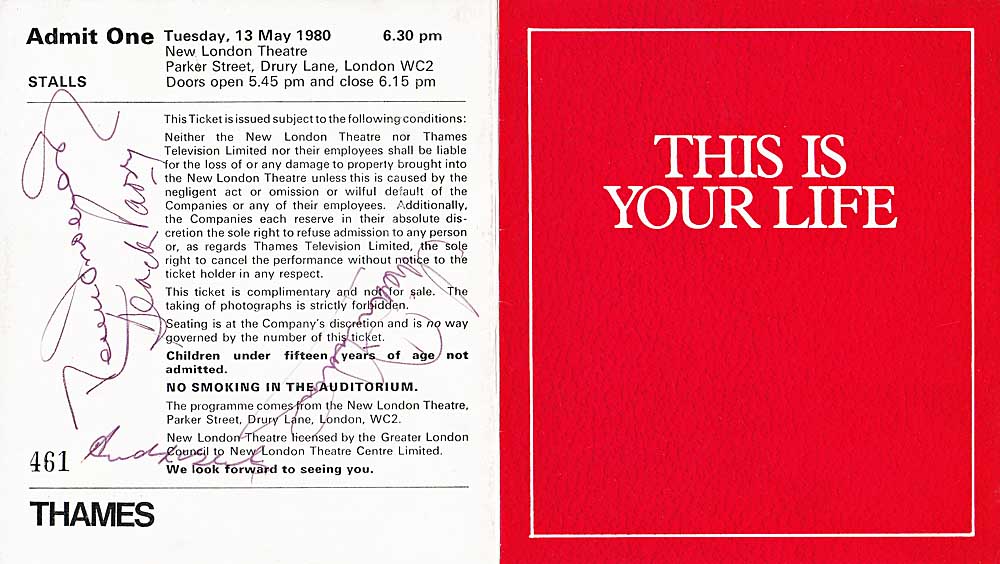
13 May 1980 - the recording of the edition featuring the cricketer Clive Lloyd - broadcast on 21 May 1980. The ticket is signed by various guests
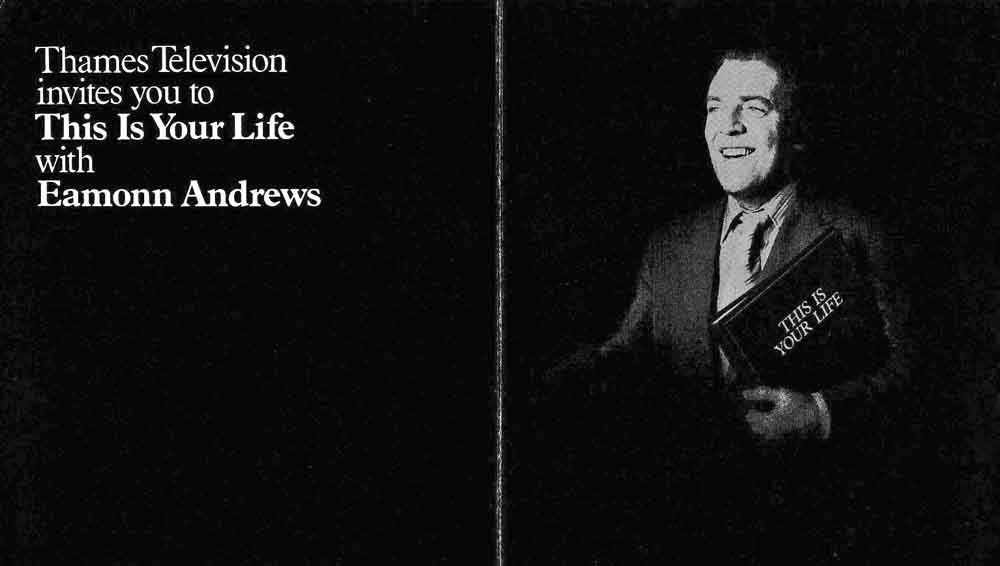
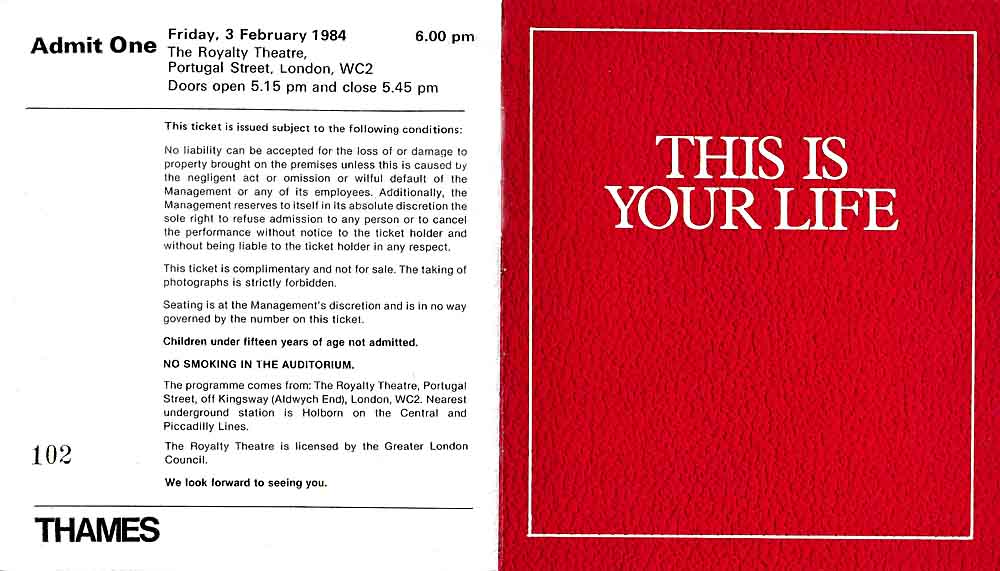
3 February 1984 - the recording of the edition featuring the actress Nerys Hughes - broadcast on 22 February 1984
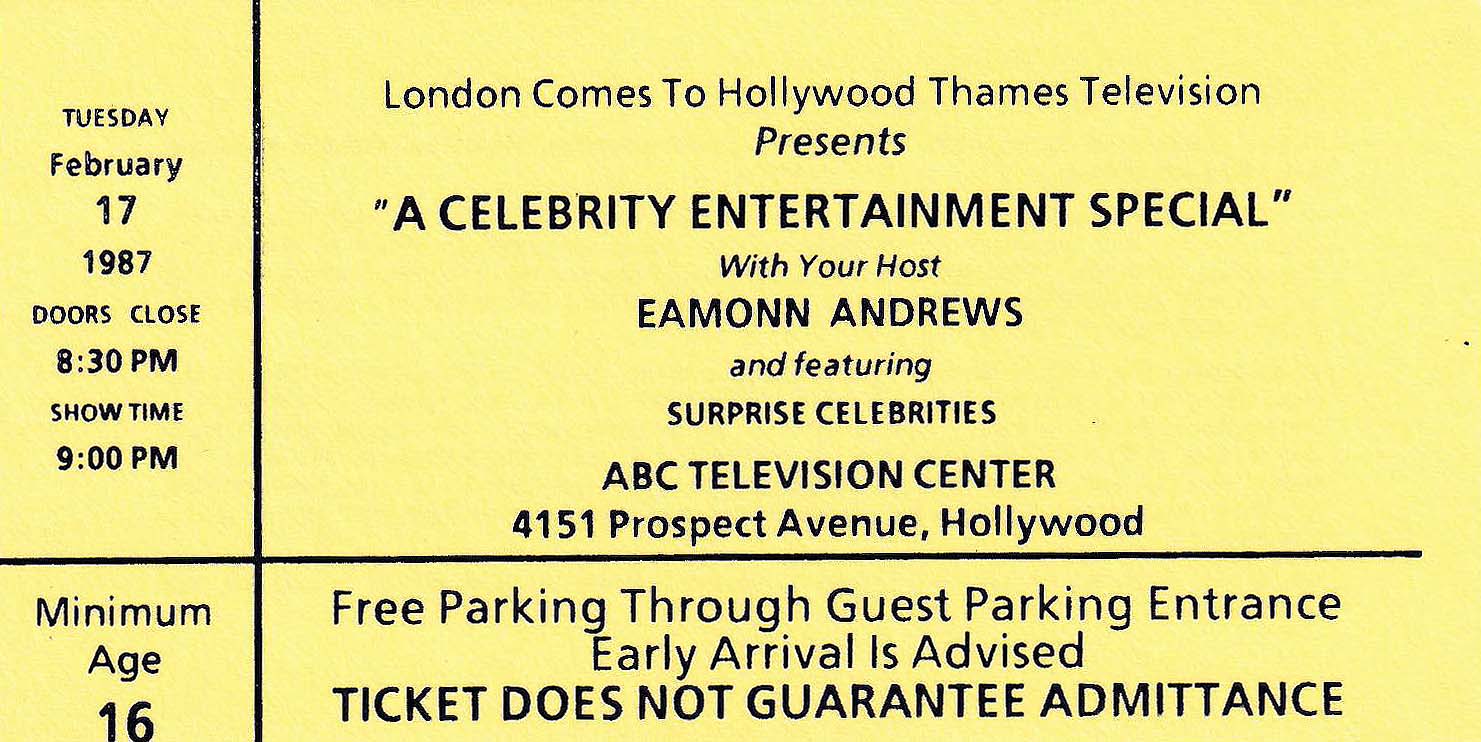
17 February 1987 - a ticket for the edition filmed in Hollywood - and notice there is no mention of This Is Your Life - featuring the actor, comedian, composer and musician Dudley Moore - broadcast in a rare two-part edition over consecutive weeks on 4 and 11 March 1987
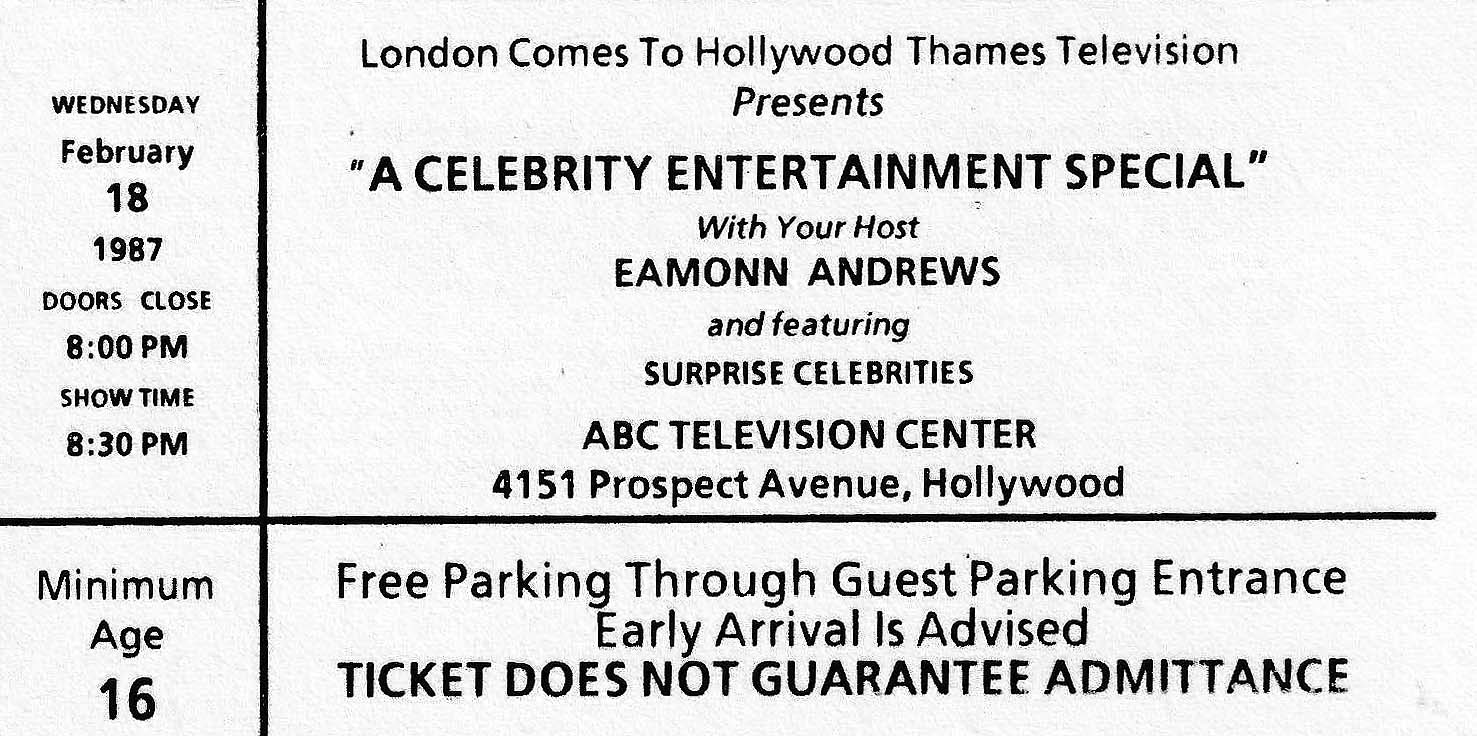
18 February 1987 - a ticket for the edition filmed in Hollywood - and again, there is no mention of This Is Your Life - featuring the actor Christopher Cazenove - broadcast on 25 November 1987
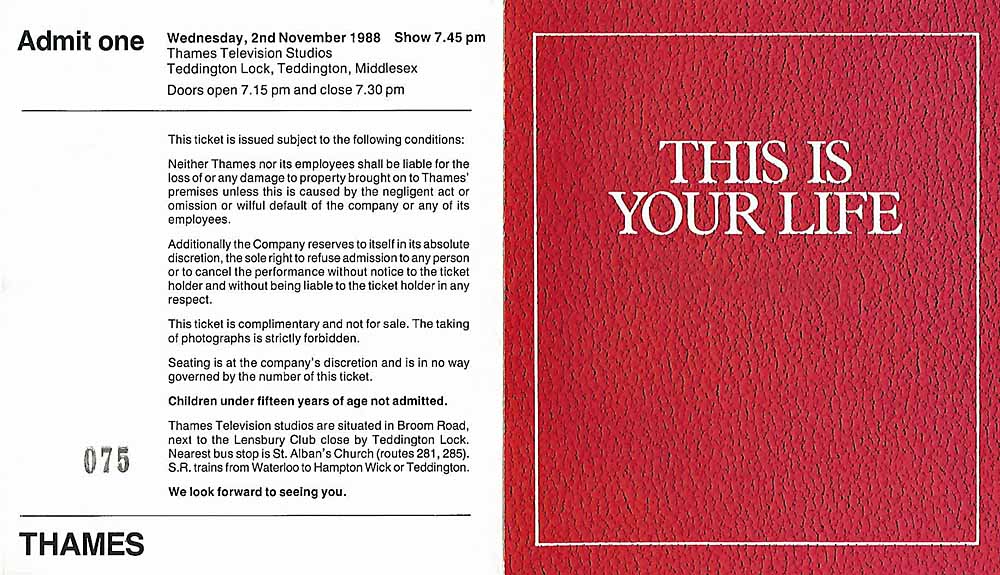
2 November 1988 - a ticket for the edition featuring the former footballer Tom Finney - broadcast on 9 November 1988
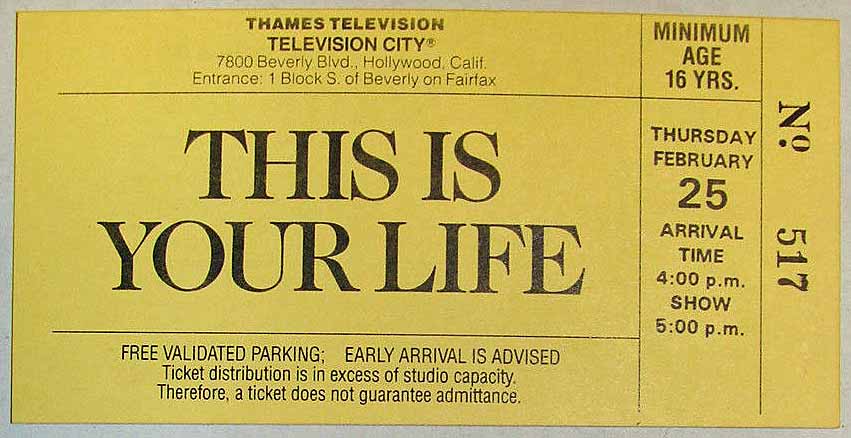
25 February 1993 - a ticket for the edition filmed in Hollywood, featuring the American dancer, singer and actress Ann Miller - broadcast on 14 April 1993
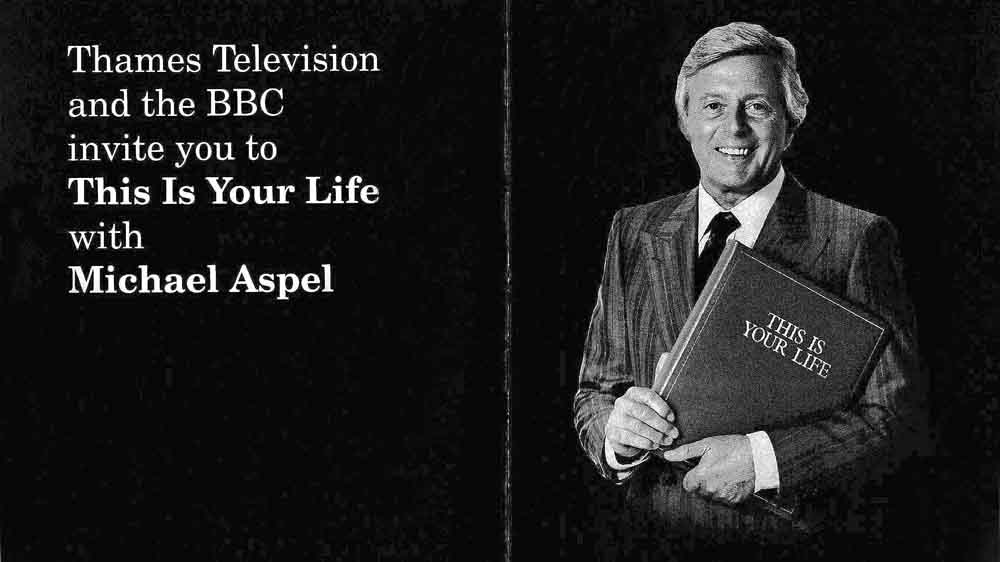
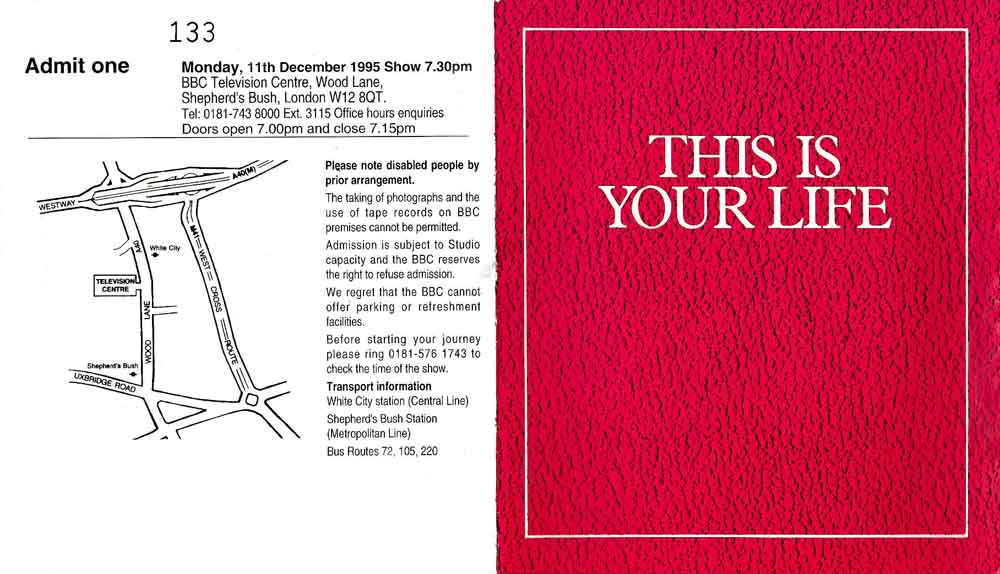
11 December 1995 - the recording of the edition featuring the writer, producer and director David Croft - broadcast on 20 December 1995
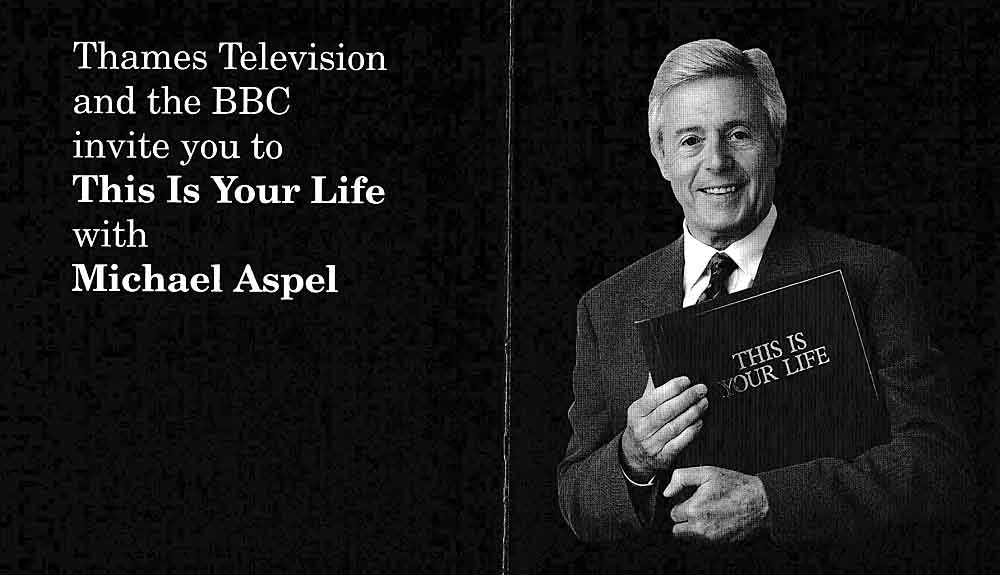
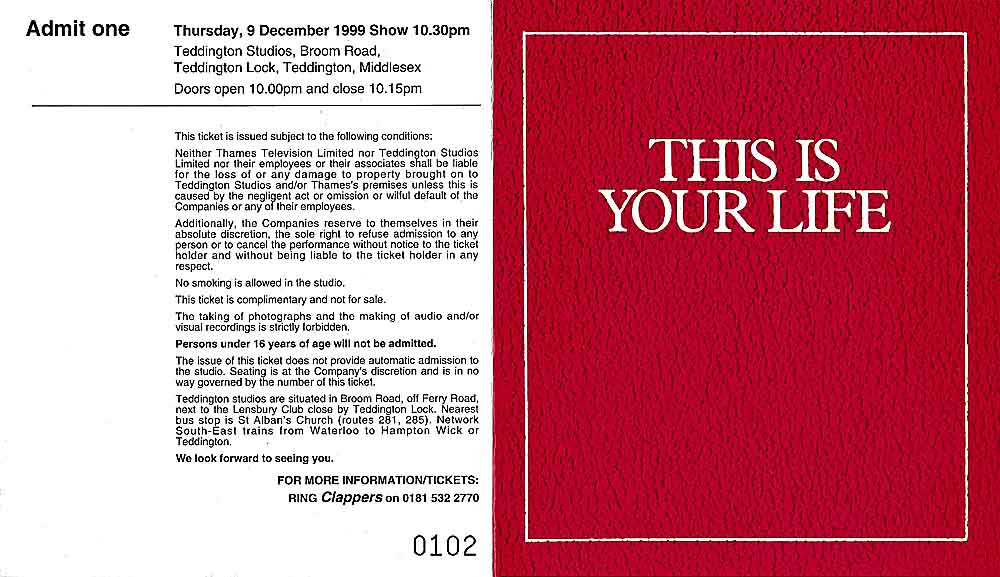
9 December 1999 - the recording of the edition featuring the comedian, writer and television presenter Harry Hill - broadcast on 21 February 1999